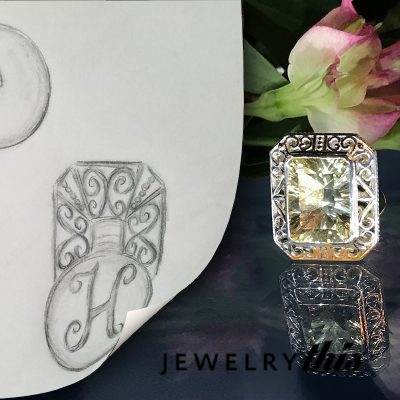How to Source Gemstones: 7 Important Tips

Buying engagement rings and wedding rings can be simultaneously thrilling and stressful for the bride and groom because there so many options to consider; style and cost are major considerations, and sometimes time and sentimental value are too.
And don’t forget the gemstone or gemstones –What shape do they want? What size? What color? Fortunately, as you can see from the jewelry design examples in our Wedding Bouquet Collection, there is a beautiful variety of gemstones that can be used for engagement rings and wedding jewelry that are sure to please even the pickiest of shoppers.
For jewelers, the trick is to know how to source them so they can offer their customers stones that not only fit their customers’ color, shape, and size preferences, but also their budget. To help with that, we’ve listed seven critical qualities below that jewelers should always check for when sourcing stones:
- Certification. In order to establish authenticity of natural gemstones, make sure your gemstone dealer provides gem certification from the best gemological labs (e.g., GIA, AGL, GRS, Gubelin). The certification should include a statement of origin and a declaration of treatments or enhancements of the stone, if any.
- Treatments. Today there are a range of treatments, from heat treatment, to diffusion treatments, to irradiation, oiling for emeralds and even laser drilling for diamonds, that are used to enhance the value and appearance of the gem. A good gemstone laboratory will check to see if there is evidence of these treatments and include this information in the gemstone report.
- Fine or commercial. Find out if your dealer sells fine or commercial grade gemstones, as there is a clear distinction between the two. Commercial gemstones are typically of a poorer quality than fine gemstones and are often characterized by average coloring, bad cutting, heavy treatments, and inferior clarity. This, of course, affects the value of the stone.
- Time in business. Check how long the dealer has been in business. Gemstone dealers that do not sell quality stones and do not offer solid and reliable service will not stay in business for long. Only dealers that provide good value and service to their clients will last. They will have been able to build and establish a loyal following of clients and found good sources for their stones.
- Loose or set stones. Beware of buying stones that have already been set in jewelry. Jewelry settings often hide flaws in the stones and can even affect their color. It is much safer to buy unmounted stones as they can be inspected for inclusions or other problems. This is why gemological labs require to test unmounted stones rather than set stones.
- Return policy. What is your dealer’s return policy? Is it fair? Is it reasonable? Reliable dealers always have a reasonable and fair return policy; they want their customers to be satisfied. Dealers who only allow returns within a very short time frame, or charge a high restocking fee are usually less reputable.
- Quality or price. If your dealer’s focus is quality rather than pricing, you’re on the right track. If the focus is on pricing, however, chances are the stones are of a lower-grade material, which you’ll likely want to avoid if you’re buying an engagement ring or special-occasion jewelry piece.Also, absolutely avoid answering the dealer’s questions about your budget. When dealers ask about your budget, they are often looking for a way to maximize your cost, often unnecessarily.
One final important tip: Remember renders! Before you even buy your gemstones, before you even make the jewelry, you can use beautiful, top- quality renders to attract and charm your customers. In fact, to help you do just that, here are 20 FREE 20 FREE renders from our Wedding Bouquet Collection that you can download for FREE!
***For a limited time only – become a Premium Member and get the STLs for FREE too!










